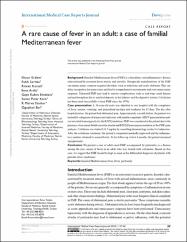| dc.contributor.author | Erdem, İlknur | |
| dc.contributor.author | Saritas, Fatih | |
| dc.contributor.author | Karaali, Rıdvan | |
| dc.contributor.author | Ardic, Enes | |
| dc.contributor.author | Emeksiz, Gaye Kübra | |
| dc.contributor.author | Kara, Sonat Pınar | |
| dc.contributor.author | Bol, Oguzhan | |
| dc.date.accessioned | 2022-05-11T14:12:33Z | |
| dc.date.available | 2022-05-11T14:12:33Z | |
| dc.date.issued | 2018 | |
| dc.identifier.issn | 1179-142X | |
| dc.identifier.uri | https://doi.org/10.2147/IMCRJ.S148205 | |
| dc.identifier.uri | https://hdl.handle.net/20.500.11776/5595 | |
| dc.description.abstract | Background: Familial Mediterranean fever (FMF) is a hereditary autoinflammatory disease characterized by recurrent fever attacks and serositis. Nonspecific manifestations of the FMF can mimic many common acquired disorders such as infections and acute abdomen. This can delay recognition for many years and lead to comprehensive assessments and even unnecessary surgeries. Untreated FMF may lead to serious complications such as end-stage renal disease and malabsorption due to amyloid deposits in the kidneys and the digestive system. Colchicine has been used successfully to treat FMF since the 1970s. Case presentation: A 30-year-old male was admitted to our hospital with the complaints of fever, nausea, vomiting, and generalized myalgia and weakness for 15 days. The day after hospitalization, the patient had abdominal pain. Approximately a month before, the patient was treated for a diagnosis of urinary tract infection, with similar complaints. MEFV gene mutation analysis revealed homozygosity for the R202Q mutation. FMF was considered in the patient due to the presence of recurrent febrile serositis attacks and R202Q homozygous mutation in the FMF gene analyses. Colchicine was started 3x0.5 mg/day by consulting rheumatology on day 8 of admission. After the colchicine treatment, the patient's complaints markedly improved and the inflammatory markers returned to normal levels. At his follow-up visit at 6 months, the patient remained asymptomatic. Conclusion: We present a case of adult-onset FMF accompanied by peritonitis as a disease among the rare causes of fever in an adult who was treated with colchicine. Based on this case, we suggest that FMF should be kept in mind in the differential diagnosis of patients with periodic fever syndromes. | en_US |
| dc.language.iso | eng | en_US |
| dc.publisher | Dove Medical Press Ltd | en_US |
| dc.identifier.doi | 10.2147/IMCRJ.S148205 | |
| dc.rights | info:eu-repo/semantics/openAccess | en_US |
| dc.subject | familial Mediterranean fever | en_US |
| dc.subject | fever | en_US |
| dc.subject | peritonitis | en_US |
| dc.subject | Subclinical Inflammation | en_US |
| dc.subject | Colchicine | en_US |
| dc.subject | Mutations | en_US |
| dc.subject | Diagnosis | en_US |
| dc.title | A rare cause of fever in an adult: a case of familial Mediterranean fever | en_US |
| dc.type | article | en_US |
| dc.relation.ispartof | International Medical Case Reports Journal | en_US |
| dc.department | Fakülteler, Tıp Fakültesi, Dahili Tıp Bilimleri Bölümü, İç Hastalıkları Ana Bilim Dalı | en_US |
| dc.department | Fakülteler, Tıp Fakültesi, Dahili Tıp Bilimleri Bölümü, Acil Tıp Ana Bilim Dalı | en_US |
| dc.authorid | 0000-0003-2440-7529 | |
| dc.identifier.volume | 11 | en_US |
| dc.identifier.startpage | 37 | en_US |
| dc.identifier.endpage | 40 | en_US |
| dc.institutionauthor | Erdem, İlknur | |
| dc.institutionauthor | Karaali, Rıdvan | |
| dc.institutionauthor | Ardic, Enes | |
| dc.institutionauthor | Emeksiz, Gaye Kübra | |
| dc.institutionauthor | Kara, Sonat Pınar | |
| dc.institutionauthor | Bol, Oguzhan | |
| dc.relation.publicationcategory | Makale - Uluslararası Hakemli Dergi - Kurum Öğretim Elemanı | en_US |
| dc.authorscopusid | 6602163658 | |
| dc.authorscopusid | 56568272400 | |
| dc.authorscopusid | 57203430154 | |
| dc.authorscopusid | 57202750841 | |
| dc.authorscopusid | 57201252046 | |
| dc.authorscopusid | 57190404723 | |
| dc.authorscopusid | 57202741493 | |
| dc.authorwosid | KARAALİ, Rıdvan/AAQ-1018-2020 | |
| dc.identifier.wos | WOS:000427426200001 | en_US |
| dc.identifier.scopus | 2-s2.0-85049162647 | en_US |
| dc.identifier.pmid | 29559814 | en_US |



















